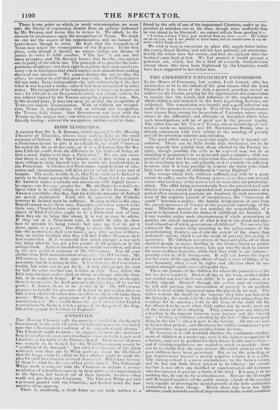There is one point on which, to avoid misconception, we
must take the liberty of expressing dissent from an opinion indicated by Mr. STURGE, and invite him to review h. We allude to the censure he pronounces upon the recognition of Texas. We think we can see the source of his misconception, and we honour its benevolence though in error. He fears that the recognition of Texas may retard the emancipation of the Negroes. ln the first place, even though it should, we cannot violate one dictate of justice in order to fulfil another. 4' The law" is not one, but many precepts; and Mr. STURGE knows that he who sins against one is guilty of the whole law. The principle of respect for the inde- pendence of nations—for their right to regulate their own social eco- nomy—is as binding as that which teaches us to abstain front making slaves of our brethren. We cannot disobey the one to obey the other ; we cannot do evil that good may come. Lord Passimisrox did not make Texas independent—he only acknowledged the fact when it was beyond a doubt—after it had been recognized by other states. Ills recognition of its independence is necessary to prevent war ; for without it our Government could nut obtain redress for any subject injured by the Texans except by a piratical war. But, in the second place, it does not seem to us that the recognition of Texas can impede Emancipation. With or without our recogni- tion, Texas is independent; with or without our recognition,
the Texans hold slaves. Our Govermiteut can treat with the Texans on the subject now ; our citizens can argue with them on a friendly footing : without the recognition, neither could be dune. --• IRISH ECONOMICS.
A LETTER from Sir A. 13. Booms:, which appeared is the Morning Chronide of Thursday, throws sonic curious light on the rural econotnt. of Ireland. Sir ARTHUR tells us, that by tekino land from a Protestant tenant to give it to a Catholic, he could " increase his rental 20, 30, or 40 per cent., as it is well known that the Ro- man Catholic could, from the difference in his habits of living, af- ford a much higher rent than a Protestant." We arc not aware that there is any thing in the Catholic creed that makes a man more willing to strip himself bare to enrich his landlord than in the Protestant. Catholics and Protestants, equal in point of edu- cation and circumstances, will drive pretty nearly the some sort of bargain. The troth, we take it, is, that Protestantism in Ireland is rarely to be found among the class that lives from hand to mouth. Sir ARTHUR makes a mistake not uncommon with logical tyros— he argues cam hoc erase, proper hue. He attributes to a titans re- ligion what is in reality owing to the state of his finances. Sir ARTHUR establishes this fact, that the Catholic tenantry of 'Ireland are grossly rackrented. Until this be amended, the Catholic tenantry in Ireland must be sufferers. So long as this is the ease, Repeal cannot make them easy, Franchise-extensiou cannot make them easy, Church-1.6mo cannot make them easy. The great object of Irish Catholics ought to be a Protestant rate of rent. How they nre to bring this about, it is not so easy to advise. If they sat at a Protestant rent, it would be easy to show how to prevent its being raised: but once up, lees. to get it down again, is a poser. One thing is clear—the tenantry must take the matter iato their own hands; and, after littiture delibera- tion, we incline to think that they will find Father MaTninv their best counsellor. It is wonderful how much cheaper a luau gets any thing after he has got a few painds in his pocket, or iii the savings-batik. Against one delusion we would warn them, and that is, the new political economy of Mr. °Vessels.. lltty all your clothes from Irish manufficturers alone, saysO'CoNNIA.I. Mr. °To:vit.:Ls has more than once given good advice to the Irish peasantry, but he is wrong in this. It is last money tint constitutes wealth, but what can be got for it. A nein who can get his coat for half the price another can, is twice as rich. Now, either the Irish manulioeurer nukes cloth as cheap or cheaper than'the Eng- lish, or he makes it dearer. If he makes it as cheap or cheaper, there is no need firs the Irish peasant's pledging himself to use his goods ; if dearer, there is 110 justice in it. Mr. °Toss:too. proposes to benefit the peasants of Ireland by persuailing them to take at vow which w ill either have no (greet 11t all, or will In:Ilse them poorer. What is the proportion of sgrielilturists to Irish manuficturers? lbes. would those oho soesk of not using English manufactures'in Ireland, relish a proposal on the part of the Eng- lish not to permit Irish labour in England''


























 Previous page
Previous page